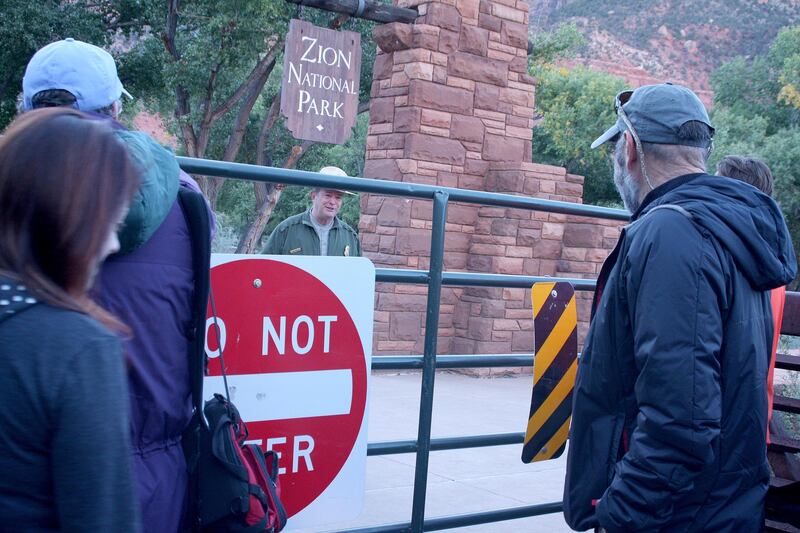Ahead of a possible federal government shutdown, Utah’s Sen. Mike Lee and Rep. John Curtis are sponsoring a bill that would require the Secretary of the Interior to pay states back for what they spend to operate national parks during a government shutdown.
Lee introduced the bill in the Senate Wednesday, while Curtis will introduce the House version of the bill.
If the bill passes, Utah and other states that want to keep their national parks open wouldn’t have to foot the bill. Instead, 30 days after the shutdown ends, the Secretary of the Interior would pay states back for what they spent to keep their parks open.
Along with introducing the bill, Lee sent a letter to Secretary of the Interior Deb Haaland.
“As the end of Fiscal Year 2023 approaches, I am deeply concerned about the looming possibility of a government shutdown,” Lee wrote. “This potential shutdown threatens the livelihoods of countless Utahns who rely on the economic benefits generated by our National Parks.”
In the letter, Lee talked about the far-reaching impact of shutting down the parks. “The potential harm of park unit closure extends beyond the economic sphere. It also threatens the long-term environmental preservation efforts in these areas. park unit closure could result in inadequate protection and management, potentially leading to irreversible environmental degradation.”
Lee urged Haaland to pay back Utah if it uses state funds to keep national parks areas open.
“If an Act of Congress is required, I ask that you support the legislation to facilitate this reimbursement and work with me and my colleagues to ensure that passage of this legislation is prioritized,” Lee wrote.
Ahead of introducing the House version of the bill, Curtis sent a statement to the Deseret News explaining his support.
“Clearly we’ve seen in the past the impact to a state like Utah if the national parks shut down. We also clearly see a loss of revenue to the federal government. This is one of those examples of a shutdown that will cost us money,” he said.
“It makes all the sense in the world to keep these parks open, and let the visitors have that visitor’s experience, protect Utah’s economy, but also protect the revenue to the federal government,” Curtis said. “So this was an easy decision about whether or not this is a bill I like because of all those reasons.”
In his statement to the Deseret News, Curtis referenced his No Work, No Pay Act, which he introduced for the third time since he has been in office on Friday. This bill would prevent members of Congress from being paid during a government shutdown.
“Can you imagine shutting down a park in Utah, people who own hotels and restaurants and things and have no ability to impact that decision, taking it on the chin financially, and members of Congress are back here getting paid during that period of time? It’s just unconscionable to me,” Curtis said.
When a government shutdown became increasingly more likely, Utah Gov. Spencer Cox started working with Utah House Speaker Brad Wilson and Utah Senate President Stuart Adams to keep the parks open.
Calling national parks “the lifeblood” of some Utah communities, Cox said he believes they can keep parks open “with existing funds without having to call a special session. So that’s the track that we are taking right now.”
During a previous government shutdown from December 2018 to January 2019 (the longest shutdown in history), Utah spent $66,000 to keep the parks open, per KSL TV. It’s unclear how much Utah would have to spend this time around.
“Some counties are almost over 90% owned by the federal government. You shut down the national parks, it destroys their entire economy,” Adams said. “If the Department of the Interior will let us, we’re not going to let that happen. We’ll keep the parks open like we did last time.”
Contributing: Brigham Tomco


